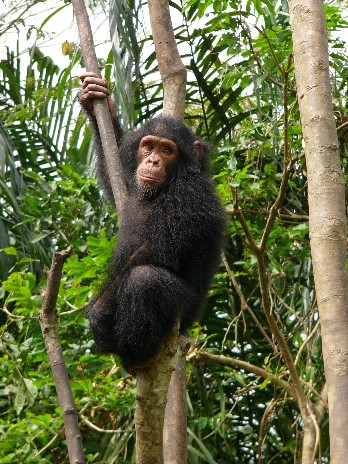
By Elias Ntungwe Ngalame
One of human’s closest animal relatives is at risk of being wiped out as changing rainfall patterns threaten to destroy its Central African habitat according to research published in BMC Evolutionary Biology.
The study that was presented in Yaounde March 30th 2015 by the Centre for Environment and Rural Transformation, CERUT, a local NGO in Cameroon points out that Climate change is a challenge not only for humans but for chimpanzees and other endangered animal species too.
‘’The Nigeria-Cameroon Chimpanzee is the most endangered of all chimpanzee subspecies in the world. While their habitats and other animal species are already threatened by logging, agriculture and illegal hunting in the forest region in Cameroon, few studies have looked at the possible effects of climate change.
The new studies have shown that while mountain rainforest habitat would survive in the short term, the lowland dwellers including Chimpanzee would decline quickly due to rising temperatures in the region,’’ Nnoko Divine, programme manager of CERUT said.
He pointed to the report which shows that Cameroon in particular and Africa in general is likely to be severely affected by climate change. “Preliminary projections suggest that rainfall patterns will change dramatically in this region of Africa, which will result in significant alterations of forest and savanna habitats,” the report says.
The threatened subspecies of the common chimpanzee [Pan troglodytes ellioti] according to the report are only 6,000 remaining surviving in two populations in Cameroon. But increasing temperatures leading to global warming the reports say put the survival of these remaining numbers at risk.
“Models of global climate change also have been used to show that 30% of plant and animal species are at risk of extinction if the rise in mean global temperature exceeds 1.5°C − an increase that is nearly certain to occur under future climate scenarios,” according to the study.
The study presents field biologist Paul Sesink Clee, of Drexel University, US, and colleagues report in BMC Evolutionary Biology which shows a combined climate, environmental and population data that models how the chimpanzees’ preferred habitats would change with climate change.
“The Nigeria-Cameroon chimpanzee is perhaps the least studied of all chimpanzee subspecies. This is the first time that their distribution and habitat has been studied in such detail, and the data used to predict how their habitats might alter under climate change.
“We were surprised to see that the Nigeria-Cameroon chimpanzees living in the savanna-woodland habitat of central Cameroon are under the most immediate threat of climate change, and may completely lose their habitat within our lifetime,” says Paul Sesink Clee, Graduate Research Fellow at Drexel University, USA one of the authors of the research.
The research team, one of the few groups studying Nigeria-Cameroon chimpanzees in the wild, mapped their precise geographic locations using reports of sightings, evidence of activity including nests and tools, and fecal and hair samples collected for genetic analyses. They mapped the distribution of two distinct populations of the species, those in the mountainous rainforests of western Cameroon, and those in central region of Cameroon where three distinct habitats converge to form a mosaic of forest-woodland-savanna.
They combined this population data with the environmental characteristics of their locations (including climate, slope, vegetation and tree cover) to determine how habitat drives the distribution of the Nigeria-Cameroon Chimpanzee. They then predicted how these habitats would change under climate change scenarios for years 2020, 2050, and 2080.
The scenarios were provided by the UN’s Intergovernmental Panel on Climate Change and considered a varying range of factors including use of fossil and non-fossil fuels, human population growth, and environmental protection efforts.










